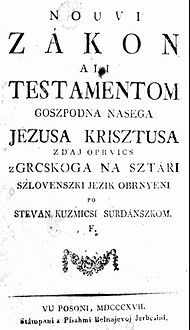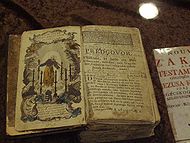- Nouvi Zákon
-
The Nouvi Zákon (New Testament) is the most famous work of the Hungarian Slovene writer István Küzmics. The Nouvi Zákon is the translation of the Holy Gospel into the Prekmurje dialect. This text and the "Szvéti Evangyeliomi" by Miklós Küzmics are the most important works in standard Prekmurian.
Contents
The Prolog (Predgovor)
Küzmics published Nouvi Zákon in 1771 in Halle, Saxony-Anhalt, with the assistance of Hungarian and Slovene Evangelics (Nouvi Zákon ali Testamentim Goszpodna Nasega Jezusa Krisztusa zdaj oprvics zGrcskoga na sztári szlovenszki jezik obrnyeni po Stevan Küzmicsi Surdánszkom f.)
There is dispute as to whether the Prolog (Predgovor), was written by Küzmics or by some other person. One other possible author is József Torkos, the Hungarian Evangelic Pastor. Torkos evidently wrote the Prolog in Latin while Küzmics in turn translated it into Prekmurian. This question was raised by the Slovene writer Mihály Bakos, who followwed Küzmics as head of the Evangelic Parish of Surd.
Original edition in the Library of Murska Sobota
The language
István Küzmics translated the Nouvi Zákon from the Greek language, (zGrcskoga na sztári szlovenszki jezik). Küzmics was born in Strukovci in Ravensko, the flatland subregion of Prekmurje, so the Nouvi Zákon was written in his Ravensko dialect. It is similar to the Bible of Jurij Dalmatin, inasmuch as numerous terms and idioms are included in the Nouvi Zákon. His immediate sources apparently were Kajkavian books. The Bishop of Zagreb in the Middle Ages led the Hungarian Slovenes, and his believers wrote the Kajkavian books. The Old Hymn-book of Martjanci was also used as a Kajkavian source, hence the Prekmurian language bears similarities to Kajkavian features.
The Catholic pastor Miklós Küzmics used the Nouvi Zákon when he translated the Catholic Gospel. The Nouvi Zákon, the Szvéti Evengyeliomi of Miklós Küzmics and the Kniga Molitvena (Old Slovene Prayer Book) of József Borovnyák are the most significant texts in the Slovene and the South Slavic literature.
Reprints
- Nouvi Zákon ali Testamentom Goszpodna Nasega Jezusa Krisztusa zdaj oprvics zGrcskoga na sztrái szlovenszki jezik obrnyeni po Stevan Kuzmicsi surdánszkom f. (1817, Bratislava)
- Nôvi Zákon ali Testamentom Goszpodna Nasega Jezusa Krisztusa zdaj oprvics zGrcskoga na sztári szlovenszki jezik obrnyeni po Küzmics Stevani surdanszkom farari. (Kőszeg, 1848, Sándor Terplán was make the second issue).
- Nôvi Zákon ali Testamentom Goszpodna Nasega Jezus Krisztusa szlovencseni po Küzmics Stevani surdanszkom dühovniki. Vödáni po Angluskom i zvönésnyem tüváristvi za Biblie. (1883, Vienna)
- Nôvi Zákon ali Testamentom Goszpodna Nasega Jezus Krisztusa szlovencseni po Küzmics Stevani surdanszkom dühovniki. Vödáni po angluskom i zvönésnyem tüváristvi za Biblie. Izdajanje Britanskog i inostranog biblijsko društva Beograd, 1928. (Beograd-Zemun)
See also
References
- Vilko Novak: Izbor prekmurskega slovstva, Ljubljana 1976.
- SIMONA SINIC: ŠTEVAN KÜZMIČ IN NJEGOV ČAS
External links
- Full text of the 1848 edition in Google Books
Categories:- Prekmurje dialect
- Slovene books
Wikimedia Foundation. 2010.


